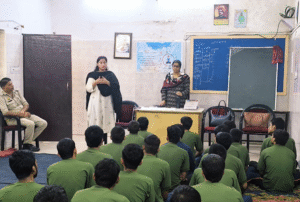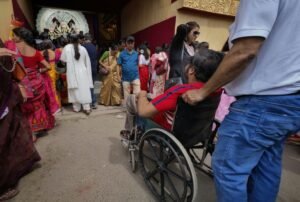
Neha* spent six years being unjustly held in an adult jail, despite having been arrested when she was a minor. Last week, after three months of efforts from our team, iProbono was able to secure her bail. While Neha has achieved a measure of redress, her story is an all too common one faced by undertrial prisoners, and indicates the systemic problems plaguing the justice system.
Neha’s ordeal began in April 2018, when she was accused of murdering her mother by her father. She was 17 years old at the time, and hence came under the legal definition of a minor under the Juvenile Justice (JJ) Act.
An FIR was registered against her under Section 304 of the Indian Penal Code, 1860, leading to her arrest. Though the police were told that she was a minor, they did not conduct an age verification process. When Neha’s matter came up for trial, the sessions judge was also informed that she was a minor when the offence occurred and was shown her matriculation mark sheet as evidence. However, the judge didn’t investigate the matter of her age any further and continued with the trial.
For the next six years, Neha was incarcerated in a prison in Uttar Pradesh. Contrary to legal mandates, she was not placed in a child care institution during her trial.
Indian courts have consistently emphasised mandatory action by all parties to prevent incarceration of children in jails. The JJ Act prohibits jailing minors under the age of 18, requiring their placement in either observation homes or ‘Places of Safety’.
In Court On Its Own Motion v. Women and Child Development[1], the Delhi High Court observed that “lodging of juveniles in prison clearly amounts to a violation of their fundamental rights guaranteed under Article 21 of the Constitution of India; contrary to the provisions of the JJ Act apart from the adverse psychological impact on these children”. Similarly, in judgments like Sheela Barse & Anr. v. Union of India[2] and Gopinath Ghosh v. State of West Bengal AIR 1984 SC 237[3], the Supreme Court emphasised the fact that the police, jail authorities, and magistrate must do their due diligence before pushing any person claiming to be a minor into the criminal justice system. Furthermore, the JJ Act mandates that the Juvenile Justice Boards (JJBs) should make regular visits to jails to identify children who are wrongly incarcerated. Neha’s case exposes a complete breakdown of such safeguards, as none of the state authorities responsible for preventing her incarceration upheld their duties.
Neha’s case is even more egregious because of the long pre-trial detention she faced. Under the JJ Act, a minor who is convicted of a serious crime faces a maximum sentence of three years. Yet Neha was held in an adult jail for over twice that time, even before the trial was concluded.
This case is also a stark example of the inadequate legal aid provided to undertrials. Neha’s legal aid counsel failed to fulfil basic responsibilities like filing a bail application, and offered no communication beyond the next date of hearing. The absence of meetings with her counsel meant that Neha remained in the dark about her case’s progress.
In November 2023, India Vision Foundation, an organisation committed to the rehabilitation and reintegration of prisoners referred Neha’s case to iProbono for legal representation. Our first step was to get the matter transferred to the JJB by initiating an age determination process. However, even after the court recognised that Neha was a minor at the time of the offence, she was not moved from the jail to a ‘Place of Safety’ as ordered. The JJB insisted on conducting another age inquiry, which took over a month to complete. While this process was underway, Neha was not transferred to a ‘Place of Safety’. Simultaneously with the age determination process, we also moved a bail application before the JJB in December 2023. It took two months for Neha to be granted bail. Even then, it came with the condition of furnishing a surety of Rs 50,000. Our team argued that since Neha lacked family support, this would be difficult for her to arrange.
We further pressed for immediate release, arguing that her pre-trial detention already exceeded the maximum sentence for a minor’s offence. This ought to have mandated her unconditional release. However, the JJB held onto a statutory requirement for a bail modification application, that could be filed only after seven days. Ironically, this rigid adherence to procedure was the one instance where statutorily prescribed legal timelines were followed in Neha’s case. This resulted in her continued incarceration for another week. Finally, Neha was released in February 2024. Since then, we have filed a petition in the Allahabad High Court seeking compensation on her behalf for her unjust incarceration. Neha now faces the challenge of rebuilding her life. Her case gives iProbono the determination to continue working towards preventing similar miscarriages of justice.
*Name changed to protect identity.
[1] 2012 SCC OnLine Del 2774
[2] AIR 1986 SC 1773.
[3] AIR 1986 SC 1773.
Authored by Yamina Rizvi, Program Officer, and Shrutika Pandey, Program Officer, iProbono.












